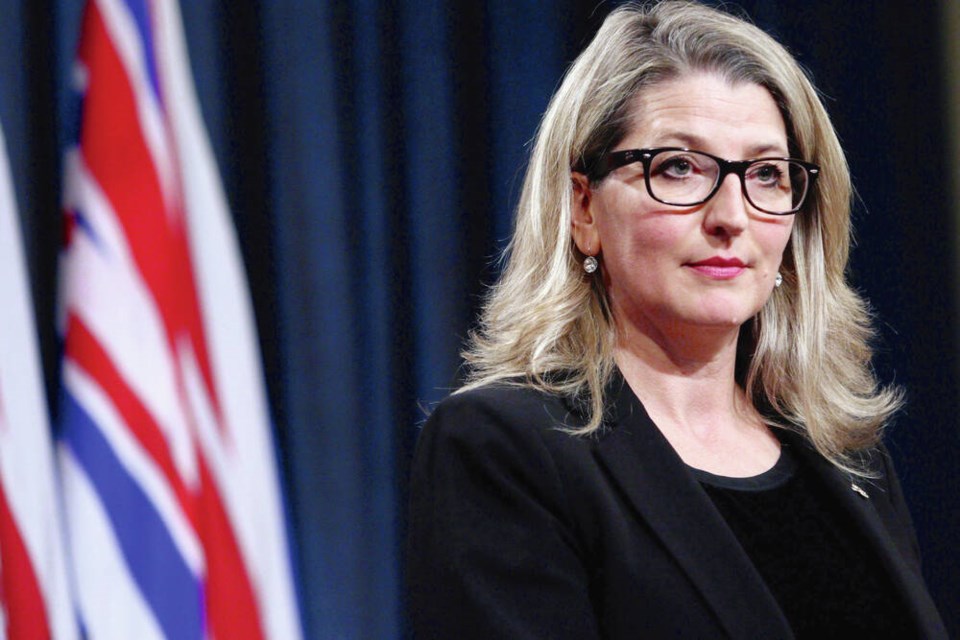Firbank Farm, one of the Island’s largest poultry producers, is on high alert after the province on Thursday confirmed the first cases of avian influenza sweeping west from Alberta and Ontario.
Diane Williamson, whose family has 78,000 meat and laying chickens on their Island View farm, said only she and her brother, Lorne Jack, are allowed in the barns, and vehicles coming and going from the property are being sprayed down.
“We are taking all [bio-security] precautions,” Williamson said Thursday.
Avian flu is spread by the feces of migrating birds. The highly infectious strain can be transmitted directly from bird to bird through secretions and feces, and indirectly through human movement, contaminated feed, water and equipment.
Agriculture Minister Lana Popham said the Canadian Food Inspection Agency has confirmed an avian influenza outbreak in the North Okanagan. The farm is reportedly in the Enderby area.
The CFIA is leading the investigation and response, and the province is providing support for testing, mapping, surveillance and disposals of flocks.
The ministry has also activated its emergency operations centre and will work with the CFIA, producers, industry and other stakeholders to respond to the outbreak and any others that may occur in B.C., said Popham.
Avian influenza cases have been increasing in the U.S., Nova Scotia, Ontario and Alberta over the past several weeks.
Prior to this week, B.C. had one recorded case of avian influenza in a bald eagle found Feb. 3 in Stanley Park.
Popham said all poultry producers, including those with backyard chicken coops, are advised to increase their bio-security practices and to be vigilant and monitor for signs of avian influenza in their flocks.
Kate Fraser, who owns Metchosin-based Bees Please Farms and offers rental chickens to backyard farmers, estimates about 1,000 homeowners in the capital region have coops.
A Facebook group called Vancouver Island Backyard Chickens and Ducks has more than 4,000 members.
Fraser said the pandemic lockdowns saw a surge in new urban poultry farms. Her own rental-bird business increased 150% in each year of the pandemic.
She said backyard coop owners should keep an eye on their flocks for avian flu. “Watch if they’re off their food or not laying as often,” said Fraser. “Chickens can hide things, but there can be obvious [signs].”
Coop owners should also watch for geese feces on their footwear if they’ve been out walking in local parks.
The province’s deputy chief veterinarian has issued an order requiring all commercial poultry flocks with more than 100 birds to be moved indoors until the spring migration of wild geese ends in May.
The impact of an avian influenza infection in poultry can vary, depending on the strain of virus.
Signs include respiratory illness, watery green diarrhea, a sudden drop in egg production and a lack of appetite.
Severe illness can result in swelling, red shanks and sudden mortality.
The province said it is important to keep poultry separated from wild birds, a challenge for small flocks with outside access and common water sources such as reservoirs.
The province’s order said the highly infectious H5N1 strain of avian influenza was detected in wild birds around Metro Vancouver earlier this year, and because waterfowl are considered the main source of the virus, steps must be taken to limit their exposure to commercial poultry.
The reported cases are being investigated in Alberta, Ontario and Nova Scotia.
The CFIA says no human cases have been detected in Canada and the illness is not considered a significant health concern for healthy people who are not in regular contact with infected birds.
“I know this is an incredibly stressful time for our poultry and egg producers,” said Popham. “They have endured so much over the past two years. They have shown they are truly resilient. We are here to help, and we will work together to get through this.”



